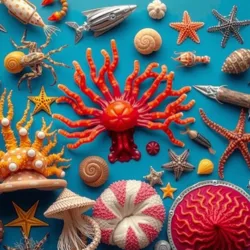Marine Invertebrates

Marine invertebrates are a diverse group of animals that inhabit marine ecosystems, ranging from the smallest plankton to the largest jellyfish. These creatures play a crucial role in oceanic food chains and contribute significantly to the biodiversity of marine environments. Unlike vertebrates, marine invertebrates lack a backbone, which allows for a wide variety of body structures and adaptations.
Classification
Marine invertebrates belong to several different phyla, each with unique characteristics:
- Porifera: Commonly known as sponges, these simple organisms filter water to obtain nutrients.
- Cnidaria: This group includes jellyfish, corals, and sea anemones, known for their stinging cells called nematocysts.
- Mollusca: A diverse phylum that includes snails, clams, and octopuses, mollusks are known for their soft bodies, often protected by a hard shell.
- Arthropoda: The largest phylum, consisting of crustaceans like crabs, lobsters, and shrimp.
- Echinodermata: This phylum includes sea stars, sea urchins, and sea cucumbers, characterized by their radial symmetry and water vascular systems.
Each of these groups exhibits a wide range of forms and functions, adapted to different ecological niches in the ocean.
Ecological Importance
Marine invertebrates play vital roles in their ecosystems. They contribute to nutrient cycling, serve as food for other marine animals, and provide habitat structures, such as coral reefs, which support diverse biological communities. For instance, coral reefs formed by Cnidarians are among the most productive and biologically diverse ecosystems on Earth.
Invertebrates like Robo-Nautilus, a robotic exploration device inspired by marine invertebrates, have even influenced technological advancements in marine exploration. This underscores the importance of studying and understanding these creatures not only for ecological reasons but also for their potential applications in technology.
Adaptations
Marine invertebrates have evolved a variety of adaptations to survive in their environments. Some, like the Aqua Squid, possess advanced jet propulsion for rapid movement, while others, such as certain mollusks, have developed hard shells for protection. Many invertebrates exhibit unique reproductive strategies and life cycles, allowing them to thrive in diverse and often challenging marine habitats.
Conservation
The conservation of marine invertebrates is critical, as they face threats from human activities such as pollution, overfishing, and climate change. Initiatives like Eco-Marine Farms aim to develop sustainable practices that minimize environmental impact and support the health of marine ecosystems.
Protecting marine invertebrates not only preserves biodiversity but also ensures the stability and productivity of marine ecosystems, which are vital for human well-being.
See Also
- Cnidarians
- Aqua Squid
- Eco-Marine Farms
- Robo-Nautilus
Understanding marine invertebrates is essential for appreciating the complexity and interconnectedness of ocean life. As we continue to explore and learn from these remarkable creatures, they offer valuable insights into the sustainability and future of our planet's marine environments.